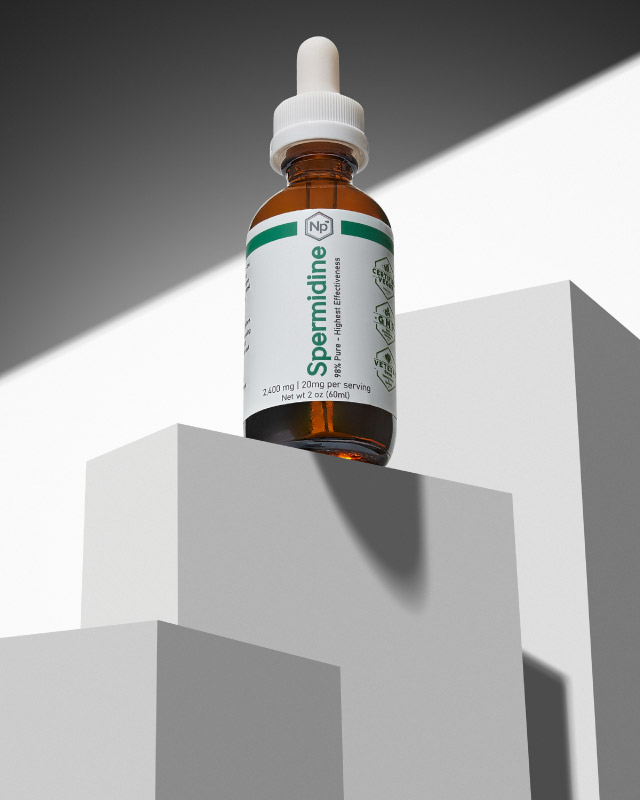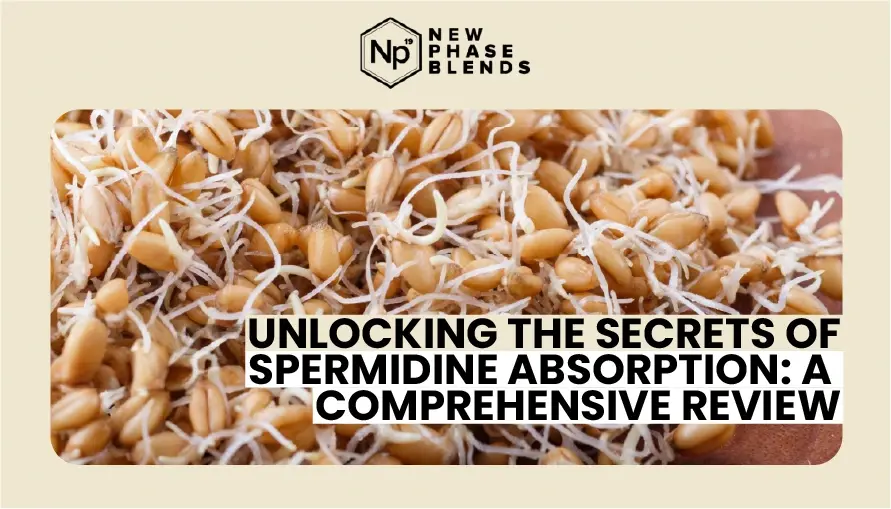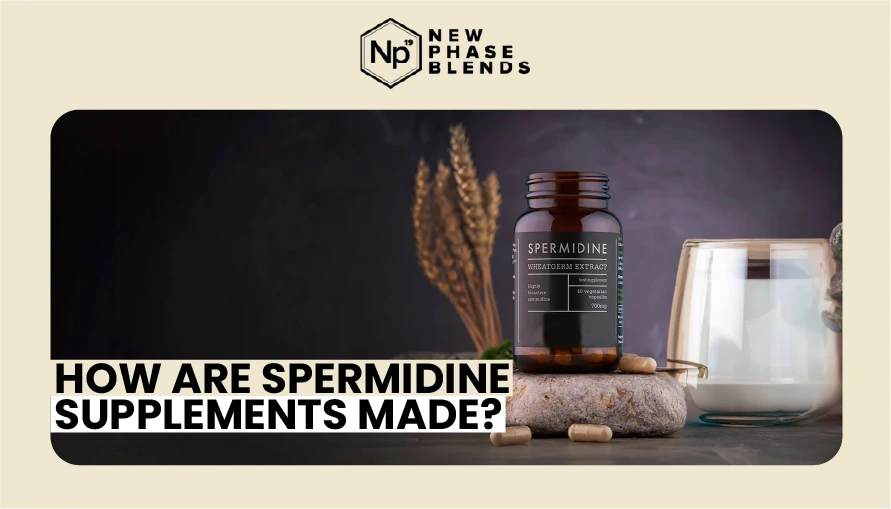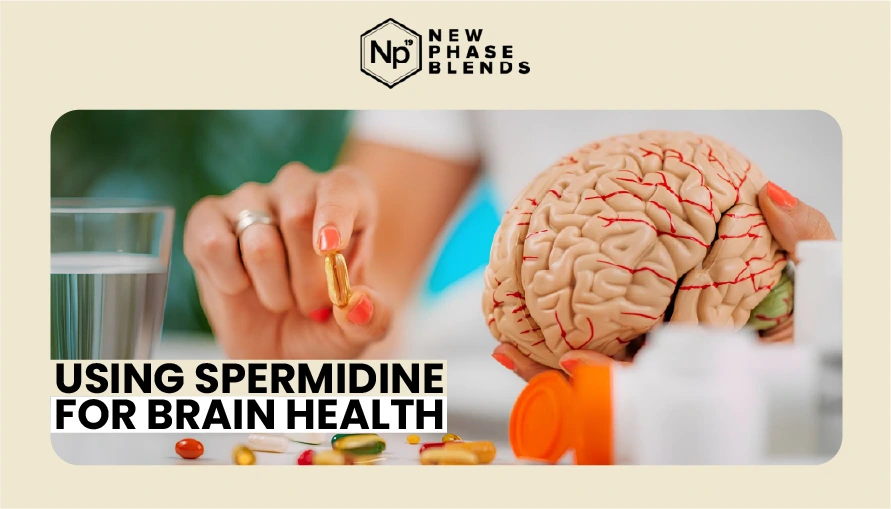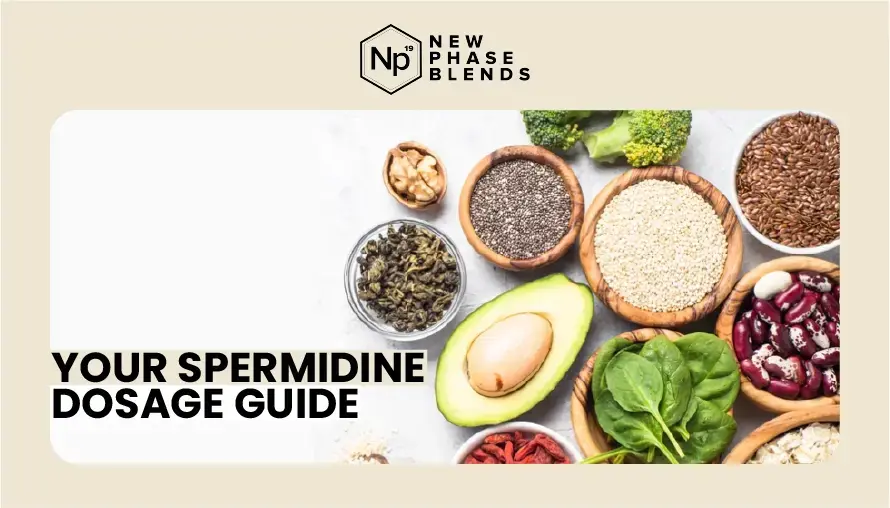Are you searching for natural ways to support women’s health as you age? Many women are turning to spermidine, a compound gaining attention for its potential anti-aging and health-promoting properties. If you’ve been wondering whether spermidine is suitable for women and how it might benefit your unique health needs, you’re in the right place.
In this comprehensive guide, we’ll explore everything women need to know about spermidine—from its scientific background to practical usage advice specifically tailored to women’s health concerns. New Phase Blends has gathered the most current information to help you make informed decisions about incorporating spermidine into your wellness routine.
What Is Spermidine and Why Are Women Interested?
Spermidine is a naturally occurring polyamine compound found in all living cells. Despite its name (which derives from its initial discovery in semen), spermidine is present throughout the human body and in many foods we eat daily.
Women are increasingly interested in spermidine for several compelling reasons. It has a strong connection to cellular renewal and longevity, offers potential benefits for hair, skin, and reproductive health, and growing research suggests it may support healthy aging.

As we age, our natural spermidine levels decline—which some researchers believe may contribute to various age-related changes. This has prompted interest in spermidine supplementation as a potential strategy for supporting women’s health across different life stages.
How Spermidine Works in Women’s Bodies
Spermidine functions primarily by promoting a cellular cleaning process called autophagy—essentially helping your cells remove damaged components and regenerate. This process is fundamental to maintaining cellular health and may help explain many of spermidine’s observed benefits.
For women specifically, spermidine’s mechanisms may offer unique advantages:
Hormonal Balance Support
As women navigate hormonal transitions throughout life—from menstruation to pregnancy and menopause—cellular health becomes especially important. Spermidine’s autophagy-promoting effects may help cells adapt to hormonal fluctuations more effectively.
Research suggests that autophagy plays a crucial role in ovarian function and reproductive health. By supporting these natural cellular processes, spermidine may help maintain reproductive tissue health longer.
Skin and Hair Benefits
Many women report improvements in skin elasticity and hair strength when using spermidine supplements. This aligns with research showing that spermidine helps maintain protein structures within cells—including those that form the building blocks of hair and skin tissue.
Key Health Benefits of Spermidine for Women
Research into spermidine continues to uncover specific ways this compound may benefit women’s health concerns. While individual results vary, studies show several promising areas where spermidine supplementation or dietary intake may offer support for women throughout different life stages. Let’s explore the most significant potential benefits that make spermidine increasingly popular among health-conscious women.
Anti-Aging Benefits
Spermidine has gained significant attention for its potential anti-aging properties, which can be particularly valuable for women concerned about maintaining youthful vitality. Research suggests spermidine’s effect on anti-aging works by slowing certain aspects of the aging process, specifically by protecting cellular DNA from damage and supporting mitochondrial function.

Studies have shown that higher spermidine levels correlate with improved markers of biological age, including better skin elasticity and cellular resilience. The compound’s ability to activate autophagy—essentially helping cells clear out damaged components—may be one of the key mechanisms behind its anti-aging effects, potentially helping women maintain more youthful cellular function as chronological age advances.
Cardiovascular Support
Heart disease remains the leading cause of death for women in many countries, often presenting differently than in men. Emerging research suggests spermidine may support heart health through several mechanisms, including helping maintain healthy blood pressure levels, supporting arterial flexibility, and promoting healthy inflammatory responses.
A long-term observational study found that women with higher dietary spermidine intake showed better cardiovascular health markers over time.
Cognitive Function
Women face unique cognitive health challenges, particularly during hormonal transitions. Spermidine crosses the blood-brain barrier and appears to support:
- Neural cell maintenance
- Healthy brain aging
- Memory and cognitive performance
Bone Health
Post-menopausal women face accelerated bone density loss, making bone health a priority. Preliminary research indicates spermidine may support:
- Bone-forming cell activity
- Calcium retention
- Overall skeletal strength
How Can Women Take Spermidine?

If you’re convinced about the potential benefits of spermidine for your health, you might be wondering about the best ways to incorporate it into your routine. The good news is that you have multiple options depending on your preferences, lifestyle, and health goals. Whether you prefer focusing on dietary sources or are considering supplements for more targeted intake, here’s what you need to know about adding spermidine to your wellness regimen.
Natural Food Sources With Spermidine
If you prefer obtaining nutrients through diet, these foods contain notable amounts of spermidine:
These include wheat germ (which has the highest concentration), mature cheeses (particularly aged cheddar), mushrooms, legumes and soybeans, green peas, broccoli, cauliflower, and grapefruit.
Spermidine Supplement Options

For women considering supplements, several options exist:
Wheat Germ Extract: The most common form of spermidine supplements, standardized to contain specific amounts of the compound.
Spermidine Complex Formulas: Often combined with other compounds that may work synergistically, such as resveratrol or certain B vitamins.
Dosage Considerations: Most studies showing benefits have used supplements providing 1-2mg of spermidine daily. However, optimal dosage may vary based on individual factors including age, health status, and specific goals.
Safety and Considerations for Women Taking Spermidine
Limited research exists regarding spermidine supplementation during pregnancy or breastfeeding. While spermidine occurs naturally in foods and breast milk, supplement use during these periods should be discussed with a healthcare provider.
Medication Interactions
Women taking medications should consult their healthcare provider before starting spermidine supplements, particularly if using:
- Immunosuppressants
- Cardiovascular medications
- Hormone treatments
When to Expect Results
Women using spermidine supplements typically report:
- Initial changes in energy levels within 2-4 weeks
- Skin and hair improvements after 1-3 months
- Long-term benefits for cardiovascular and cognitive health with consistent use over 6+ months
Common Questions Women Ask About Spermidine
Is Spermidine Safe for All Women?
Spermidine from food sources is generally considered safe for most women. For supplements, safety profiles are still being established through ongoing research. Women with specific health conditions should consult healthcare providers before beginning supplementation.
Does Spermidine Come With Side Effects?
While spermidine from food sources is generally well-tolerated, some women may experience mild side effects when taking concentrated supplements. These can include:
- Digestive discomfort, such as mild nausea or stomach upset
- Temporary changes in appetite
- Headaches when first starting supplementation
Most side effects of spermidine tend to be mild and often resolve as the body adjusts to supplementation. Starting with lower doses and gradually increasing can help minimize these effects.
Can Spermidine Help with Menopausal Symptoms?
While not a direct treatment for hot flashes or other acute symptoms, spermidine’s cellular support properties may help tissues respond better to hormonal changes. Some women report improved energy levels and sleep quality when taking spermidine during perimenopause and menopause.
How Does Spermidine Compare to Other Anti-Aging Supplements?
Unlike some anti-aging compounds that work through hormone modulation, spermidine operates primarily through autophagy activation—a fundamental cellular process. This may make it complementary to other approaches in a comprehensive healthy aging strategy.
Expert Tips for Women Starting With Spermidine
- Begin with food sources before considering supplements
- If supplementing, start with lower doses and gradually increase
- Consistency matters more than high doses
- Combine with other autophagy-promoting practices like intermittent fasting (when appropriate) and regular exercise
- Track your results by keeping notes on energy, sleep quality, and other subjective measures
Conclusion: Is Spermidine Right for You?
Spermidine offers promising benefits for women’s health, particularly in supporting age-related concerns from cellular health to cardiovascular function. While research continues to evolve, current evidence suggests it may be a valuable addition to a comprehensive wellness approach.
As with any supplement, individual results vary based on factors including age, overall health, and lifestyle. The best approach is informed decision-making in partnership with healthcare providers who understand your specific health history and goals.
By combining spermidine-rich foods or targeted supplements with other healthy lifestyle practices, women can support their body’s natural cellular health systems—potentially gaining benefits that extend from immediate wellbeing to long-term healthy aging.




